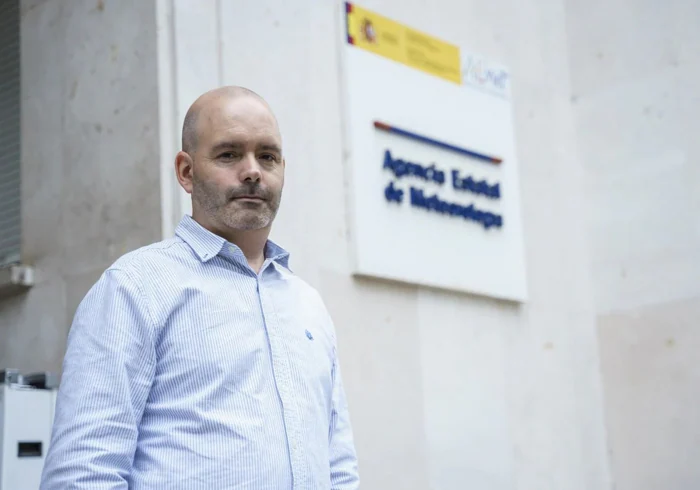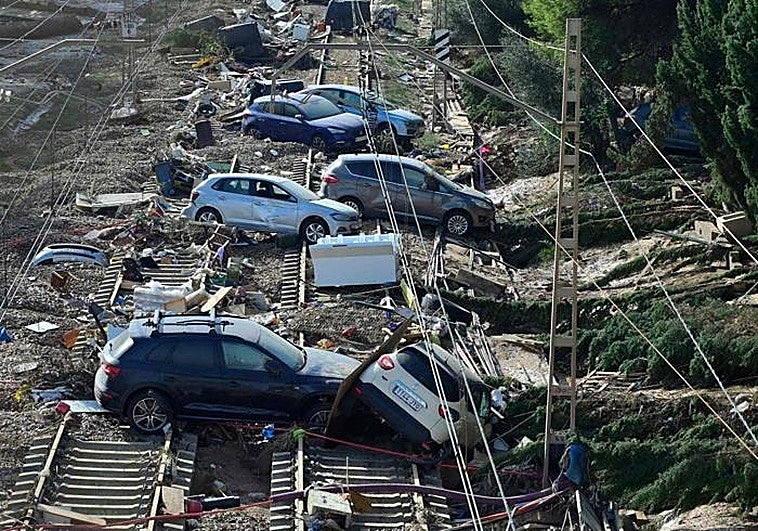Aemet spokesperson: 'When a weather warning is red you can't carry on with life as normal, and this message has to sink in'
Rubén del Campo, from Spain's state meteorological agency, speaks about the awful weather-related tragedy that struck the Valencia region, leaving hundreds dead in its wake
Rubén del Campo is spokesperson for Spain's state meteorological agency, Aemet. He has spent the last few days attending to media from all over the world and in daily meetings to manage the information on the Dana that has caused widespread devastation, especially in Valencia.
In this maelstrom of work and little or no sleep, del Campo has had time to draw some lessons from the tragedy, for example how to ensure that the red level warnings, the maximum alerts like the ones the agency launched on Tuesday at around half past seven in the morning, are understood by the population. "It's a nuisance and there are socio-economic and cultural factors that make it difficult... but when there is a red warning, life has to be altered so that people don't expose themselves, don't travel and look for a safe place," he says.

Zoom

Aemet has been in the eye of the storm after the criticisms of leader of the opposition Partido Popular (PP), Alberto Núñez Feijóo, who questioned the information provided by the the agency. Del Campo avoids assessing the position of the president of the PP, but reflects, "We have to think about whether these statements, whether they come from one colour or another, help or not. Now is the time for all of us to work together."
He took the opportunity to applaud the "commitment" and "dedication" of all his colleagues, especially "the extraordinary work" done by José Ángel Núñez, spokesperson and head of climatology at Aemet in Valencia. "Hats off for the work he has done on the ground and with the extra emotional component he has. He has stood up for himself at all times and I want to thank him publicly," said del Campo.
-Aemet issued a red alert level warning very early on Tuesday, the day of the Dana, but life pretty much went on as normal until hours later when the torrential rains began to fall and the rivers began to overflow in inland Valencia. What can be done to ensure that these messages of extreme risk quickly reach the population?
-I don't have a clear answer, but of course something has to be done to get these messages across to the population. Perhaps it has to be done in schools. Educating children that there are flood zones and that in these situations they should take extreme precautions. It must also be made clear that when the meteorological services issue red level warnings, the danger is extreme, and therefore normal life is not possible. It is a nuisance, there are socio-economic and cultural factors that make it difficult...but when there is a red warning, life has to be altered in order to try to be in a safe place, not to travel, not to expose oneself, to stay away from flood zones... although on this occasion the magnitude has been so great that it is difficult to be in safe places. We need to look very calmly at what can be done so that this does not happen again.
-You were forecasting rainfall that could leave or exceed 180mm in parts of Valencia, but this amount was tripled in some areas... could the impact of these storms that caused such torrential rain for hours have been foreseen?
In Turís, for example, we recorded more than 600mm in less than twenty-four hours, which is an exorbitant amount. When we issue a red warning we issue it because it is foreseen that the threshold could be exceeded. A red warning with 180mm does not mean that this amount is going to fall, but that this figure may be exceeded and that the danger is going to be extreme. Obviously, if the amount is multiplied by three or four, the impact is enormous. It is very difficult to accurately predict such an enormous amount of rain in such a short time and in such a specific area because of the conditions under which weather prediction models work in a chaotic atmosphere.
- Would you act the same today or do the protocols need to be changed?
-As far as meteorology is concerned, we issue alerts through social media networks, informative press statement, special warnings through the meteoalert plan... we warn a lot but obviously it has not been enough. Clearly we need to be more active with the warnings and analyse what can be done to get the message across more. Maybe with you, maybe with the media? But everything needs to be done to get the message across more efficiently and better.
-The criticism of the Valencian regional government's delay in launching the ES-Alert message is widely known. I know that pressing that button is not up to Aemet, but was it pressed late?
-The earlier the alert is issued, the better, so everything has to be analysed.
- Although now is the time to locate the missing and help the victims, what can be learned from this tragedy? Are you in a position to make an emergency analysis of what has happened to see where there is room for improvement?
We are still in the post-flood phase, but there is clearly much room for improvement. From providing Aemet with more resources to improve research and predict such extreme phenomena with greater accuracy in advance, to improving all the communication protocols between different bodies, as well as the transmission of warnings to the population. It is clear that all this needs to be improved.
"More frequent and more intense 'Danas'"
-With the Dana we are back to talking about climate change and how the warming of the Mediterranean has been the fuel for this phenomenon... do you think this tragedy is going to convince any deniers?
-The deniers cannot be convinced. It is clear that climate change intensifies extreme weather events. The World Meteorological Organisation itself has echoed a report by the World Weather Attribution (WWA), a global reference group studying the contribution of climate change to an extreme event, which says that this phenomenon may have been 12 per cent more intense due to climate change and up to twice as likely compared to pre-industrial climate.
-Should we get used to it then?
-We have to get used to the fact that climate change brings energy to the climate system, to the ocean, to the atmosphere and this makes these phenomena more intense, but also more likely, and they are also occurring in unusual areas, as happened in Madrid in September last year, or out of season. We have seen huge cold drops in spring, when the sea is very cold in general. So if the naysayers don't want to see it, that's their problem.
-But you can say that there have always been Danas....
-Yes, of course. But with climate change, not only are there not going to be no more, but there will be more. Spain is a country that is exposed to these types of extreme meteorological situations and in all sectors of society we have to work to avoid tragedies of this type.
"I have a feeling of multiple emotions. The word is not satisfied, but calm. We have done the job in the best way we could; we are left with the bitter taste of tragedy".
- How do you feel about yourself as a spokesperson for Aemet after this tragedy?
-Right now I have a feeling of multiple emotions. The word isn't pleased. I wouldn't know how to define it. I think we are at least reassured. We have done the job in the best way we could. The state meteorological agency made the predictions in the best possible way, as science is today. We warned, we informed... but we are left with the very bitter taste of the tragedy that has occurred and of what more can be done. This is my feeling as spokesperson for a whole group of a thousand workers who make up this organisation with an enormous vocation for public service.
-Did Alberto Núñez-Feijóo's words questioning the information provided by Aemet before the tragedy hurt you as a spokesperson for this group?
-We are not going to evaluate what the politicians have said, but I would like to reflect on the fact that we need to think about whether these statements, whether they come from one colour or another, are helpful or not. Or if, on the contrary, it is preferable for everyone to be united and work now to solve the crisis that has arisen after the flood, which is important. Everyone, the State, regional administrations, meteorological services, hydrological services, Civil Protection authorities? We must all work together, we must all pull in the same direction and work to ensure that this does not happen again. That is what I think is important.
-What did prime minister Pedro Sánchez tell you at Friday's meeting?
-He conveyed to us the Spanish government's support for Aemet, and this is something we are obviously grateful for. And we also told him that the state meteorological agency needs more human and material resources to better deal with situations like this, especially in a context of climate change in which these phenomena are going to be increasingly intense and frequent.

